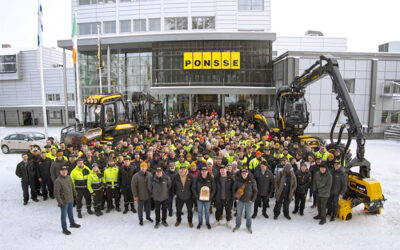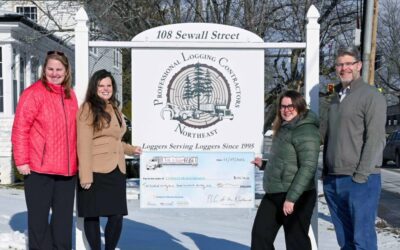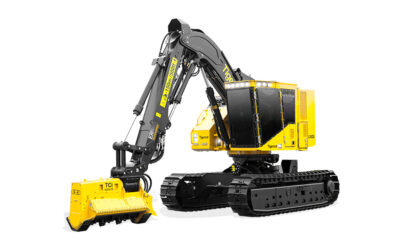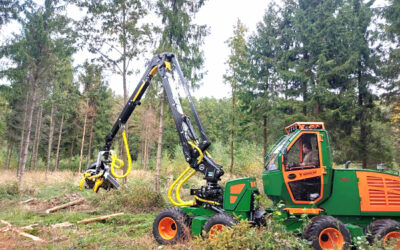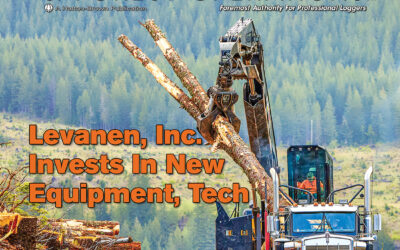An Aging Forwarder Holds The Fate Of Vermont Logger Dave Goodhouse
Timber Harvesting September/October 2016
Note: Thanks to TH columnist Wendy Farrand for discovering the following article about Reading, Vermont area logger Dave Goodhouse in the August 14 issue of The Boston Globe and passing it along. I was so taken with the way it portrays a small logger’s struggle in a changing world, not to mention the talent of the gifted writer, Sarah Schweitzer, that I asked for and received permission to share it with our subscribers. The text has been lightly edited for brevity. Enjoy.
Goodhouse, doing business as Rolling Meadows Farm Logging, operates in southern Vermont, which is rural but has a growing population of “outsiders” who do not applaud a business that cuts down trees. He works in very small woodlots and has only 2-3 employees, which he reports are very hard to find and retain.
The red oak had fallen clean, and it was nearly perfect. With a trunk straight and wide, and not showing a single woodpecker’s dent, there was money to be made on it.
But time is money, too, and Dave Goodhouse was losing both as the logs slipped once, then twice, through the worn loader grapple of his old TimberKing forwarder, a machine he’d already thrown plenty of good money after. Thousands for a new steering system, many more to replace the hydraulic pump. And still the pines and ash and oaks kept slipping away.
Since he was 19, he’d made his living in the woods, felling trees that produced paper, built houses, made baseball bats. There was pride in producing America’s raw materials, contributing to the nation’s prosperity. With a chain saw, he could be his own man.
And then the world went and changed around him. Wood from Brazil, Canada, and Russia now competed with his. To keep up, he needed expensive, ornery machines, like the one he was trying and failing to maneuver. They called it a forwarder, but it seemed more and more to go nowhere but backward. The machine heaved and then shuddered as it again dropped logs from the loader grapple.
Technology and global trade had remade his industry, and he’d adapted, but only by sinking deeper and deeper into debt. He was already on the hook for $1.2 million for his trucks and equipment. Bank loan payments claimed some $15,000 every month—40% of what he brought in. The forwarder needed replacing. Chances were that it would break down soon, and then sit idle, losing him thousands while his competitors scooped up his work. But at $400,000, a new one would deepen his debt and he’d have to cut more wood.
Out there, the news blared of people demanding a stop to forces displacing what once had been. Immigrants. China. Muslims. People who wanted to use bathrooms intended for a gender they hadn’t been born to.
In Vermont, displacement looked like this: a 53-year-old sweating it out in an ailing forwarder, trying to hold on in a changing world.
His wife said he needed to be harder on his workers, but he hadn’t gone into logging to browbeat a crew. Besides, he didn’t have the makeup to furrow his brow for long enough. He smiled widely, openly, and without guile, much like a Labrador.
He thought about bailing on logging, forgetting its headaches. He had an offer to manage a farm owned by an out-of-towner, making a farm look like a farm while the owner was busy making money on State Street or Wall Street. And then who would Dave Goodhouse be? A yes man.
No, he’d try once more to manage his burden, his heart racing under the stress of trying to figure out where he fit into a landscape he no longer recognized.
Here was what he knew. The woods on a morning like this one were drenched in green. From its hollows, deer ventured strangely close to the racket he made. He’d once seen a coyote feasting on a doe carcass. It was bloody and grim, but also remarkable. He was privy to a wild theater. Were the woods an addiction? Possibly. There were worse.
“Hiya,” he called to a long-haired guy.
The man arranged for him to clear a patch of pines, beech, and maple from 250 acres he’d inherited from a long-ailing aunt. The man drove a beater, seemed to be home more than not, and apparently needed the money from the trees to pay the property taxes. Everyone had challenges. Goodhouse had his. He’d always assumed he could overcome them with hard work. His father had a saying, and he’d written it on poster board and tacked it to the back wall in his shop: “The secret to success is to do common things uncommonly well.”
The Journey
He’d been 9 when he cut his first tree. School hadn’t been for him, trying and failing to concentrate. But the notch he made in the pine had been just right, and then he’d axed another and another and the trees fell the right way. He piled the logs atop one another and soon a cabin stood as proof of something he did well.
He’d rushed headlong into the industry a decade later, buying a chain saw and skidder with money earned from milking cows and pumping gas. He was young and his partner was too, and they failed. He retreated, working days for an old-line logger and checking IDs by night at a club.
Susan, a brunette Colby-Sawyer College graduate, bartended. She took a liking to the tall, lean bouncer who invited her to go with him to see logging sites. The brawny, gritty work was different from what she knew. She liked it, and Dave Goodhouse was kind and decent. They married in 1987.
To be young and devoted to logging meant driving by a saw shop and dipping inside to handle this chain saw and that one, pulling their starter ropes, getting a feel for their speed and power. It meant getting the Husqvarna catalog and enjoying a buzz when there was a new model, then motoring down to Springfield, Mass. to see the latest and greatest at the Northeastern Forest Products Equipment Expo. It meant sucking in your breath in 1989, signing bank documents, and trying once again to make a go of it on your own.
A good day yielded 100 trees. The crash of each was spectacular, loud and calamitous, and then the quiet as a wash of sunlight rushed into the breached space. Branches snagged him; roots tripped him. The chain saw managed the rest of the damage. “Gravity never sleeps,” he warned the guys he hired as the business grew. Actuarial tables for logging were terrifying. He backed them up. He’d crushed his shoulder blade, cracked six ribs, lost teeth, broken his neck and pelvis. He convalesced and made his way back to the woods to take his chances and once more chase the dream with a chain saw.
Frustrations Aplenty
The big machines he had now were safer. They were faster. They were also places of stillness, sealed off from the woods, traps for his mind. In the cab, he worried over bank payments, the next job, the next breakdown, the slumping price of pulp, the rising cost of insurance, the week he’d had recently when he took in just $3,459.75 and had written “ouch?!!” in the wire-bound notebook he used to track his finances.
“Too much time to think,” he said as he shifted the forwarder into gear to rumble to where his guys had begun cutting. He thought about flicking the radio to 105.3’s Cat Country. The DJ was always on a tear about something. Drug testing welfare recipients. Immigrants. Heroin addicts. Anger wasn’t Goodhouse’s style, this whipping fury. He held tight to frustration, waiting for the left side of his head to stop throbbing. There were times, though. A few days earlier, the third axle on his log truck broke, gumming up the whole operation, and he’d thrown a wrench and sworn and gotten so upset he couldn’t think.
At the end of this day, another moment. He was at his desk behind the workshop, listening to voicemails on a cell phone that got no reception in the woods, when Matt, one of his young workers, popped his head in the office. “Chain saw bar broke,” he said, holding up mangled metal.
He’d fixed the thing earlier that day. He couldn’t stop the bleeding. Every day, more money gone. Every day harder to earn back. He kept a magazine clipping in his desk. It laid out the industry’s woes: Fuel costs had risen 400% in the last two decades, labor 67%, equipment 112%, trucking 41%. Meanwhile, money earned from the wood he cut had risen just 37.5%. The clipping, not a year old, was frayed and worn, like he kept it close, a charm to remind him bad luck wasn’t his alone.
Now, he laughed, as if in momentary defiance. “There’s another 50 bucks gone.”
As Matt shrugged and walked off, unburdened, Goodhouse’s smile faded to a blank stare and a thought beat around his head: I’m the dummy who can’t give it up.
At 6:59 p.m., a few weeks later, Goodhouse walked into the kitchen of his antique Cape in the grassy hills outside Reading. He looked stunned. It had been a warm day—not off the charts, in the 80s–-but in the forwarder, sitting over the engine, its diesel pulsing, it might as well have been a furnace. He lifted the newspaper and fanned his mottled face, iced a glass of wine, then slumped into a chair so that his John Deere suspenders went slack over his stomach.
It was just him and Susan. His daughter was somewhere in Boston, doing Pilates or meeting up with friends or doing whatever a 27-year-old office manager of a start-up did on a Tuesday night. His 25-year-old son, David, would be home later. He was out riding dirt bikes with friends.
He hadn’t had lunch, and wasn’t really hungry, but Susan had fried sausages and onions and so he ate, and afterward, while she washed dishes, he sat thumbing through the latest issue of Timber Harvesting magazine. He saw big, yellow machines that could make you money. He flipped and flipped. Near the back of the magazine, he stopped on a logging company profile. He tapped at a photo of the owners, Frank Sr. and Frank Jr.
“All the successful companies are father-son,” he murmured.
He and Susan had brought their newborn son home on Valentine’s Day 1991. Dave had named the boy after himself, and a nickname attached: D2. His son had been a snuggler as a child, always sneaking into bed with him and Susan, wanting to be close. In high school, he’d written an essay called “Future.” Goodhouse kept a printed copy of it in his desk in the workshop office. “I mostly want to be a logger so I can run the machinery,” his son had written. “Although the future may not be very clear, I am pretty sure I want to do what my dad does.”
D2 worked with him for three years after high school. At the father’s instigation, the pair started days at 2 a.m., as if not a moment should be wasted now that they had a partnership. And then, one day, his son quit. “I’ve watched you suffer and I don’t want to suffer like that,” Goodhouse recalled his son telling him.
His son bought four riding mowers and hired some guys to cut grass with him. He saved enough money to buy two trucks, a Jetta sedan, and two boats, and after a few years it was clear he wasn’t coming back.
Goodhouse still ached over it. He couldn’t shake the sadness. It was a sadness that went back to his own beginnings.
“I got no history,” was the way he thought of it. When he was days old, he’d been left in the rear pew of the Sacred Heart Catholic Church in Bennington, his cries heard shortly after 7 p.m. by a praying parishioner. Dirt and twigs clung to the blanket of the blue-eyed 7½-pound baby, and speculation, according to an account in the Bennington Banner, was that he had been delivered in the nearby woods.
Nuns raised him for six months, and then a nice couple from Woodstock adopted him. His father was college-educated, an extension agent for the University of Vermont. Goodhouse loved the man, but there was a gap between the bookish father and the restless son.
In his own son Goodhouse thought he had found alignment, someone who shared his values and rooted him in the world. And then, it fell away. He tried to understand. Susan explained their son was happy, making money, a success. He nodded at the obvious truth. And he was proud of his son. But at moments his own disappointment erupted in irritable asides: What did lawn-mowing produce?
Susan wiped the counters with a rag, rubbing in circular motions. She kept books for her husband and son and managed a business herself, renting a small house they owned up the hill. She had no problem evicting people who didn’t pay, gently but firmly.
“You know Matt left at 2?” she asked her husband.
He shook his head. Matt had begged off logging for the day, saying it would be too hot to work. Dave had sent him to cut firewood in the lot next to their house.
“He clocked out at 3,” he said.
“He left at 2,” Susan said firmly.
“Oh well,” he said.
She said no more. She would never say so, but she knew what he was thinking. His son could have plugged the hole. He would’ve fired such a guy.
A New Forwarder?
The Caterpillar salesman wore a madras shirt and khakis and carried an iPad. His face was pleasant and fixed with a dim smile as he clicked photos of Goodhouse’s ailing machinery. The forwarder had 11,000 hours on it. It was still dropping logs, its grapple nearly done for. Goodhouse folded his arms, getting nervous.
The plan was for the salesman to take the photos back to the office. He’d have numbers soon. The assessed value of the forwarder would be good or bad, a way up or maybe out.
Goodhouse hiked up his suspenders and looked to the salesman, suddenly expectant, as though the salesman might have answers for him, something more than just a trade-in quote.
“I lie awake at night thinking about what to do,” he pressed. “The markets are scary.”
“Well, the hardwood log market is really strong,” the salesman offered.
It was true. But pulp prices were down. Pellet plants in Maine had closed. And it was all going to flip-flop again, these crazy markets dictated by countless invisible hands, upsetting the status quo.
He had only to look down his own road to be reminded of outside disruptive forces. A retired Boston-area ophthalmologist had moved into a red Cape around the corner from the depot where he kept his logging equipment. A few years back, she complained about the noise he made in the depot. He balked. She sued. He spent thousands on legal fees and, in the end, agreed to her terms: No noise until 7 a.m. in the spring, 8 a.m. the rest of the year.
The agreement meant forfeiting valuable working hours and, perhaps, some part of himself. “Big fancy eye doctor from Boston came up and told us what she was going to do and she was shocked her position in life didn’t impress us,” he said in one breath, and then, “If you don’t forgive and forget, it’ll kill you.”
The salesman walked to his truck.
“You’ll get me the quote?” Goodhouse called after him.
“I try to work with people best I can.” The salesman seemed to wince. He’d been a logger, too. He’d gotten out.
On a Saturday afternoon, Goodhouse dressed in a short sleeved button-down and Carhartt jeans and he and his wife drove over to the Catholic church in Windsor.
He felt funny saying so—loggers were supposed to be tough guys— but he liked going to church: “Even if you don’t believe in God, it makes you responsible for your actions. Going to church makes you think.”
A breeze circulated in the chapel, and the priest’s green robes billowed behind him as he stepped to the pulpit. “Oh God from whom all good things come.”
Goodhouse leaned back in the pew. He shut his eyes to listen to the priest’s homily. He brought the priest firewood. The priest was a do-it-yourself sort. He liked to cut and split it himself. Goodhouse respected the priest for it.
“Our God is the God of mercy.”
One of the readings had been from First Kings, in which Elijah called out to God three times asking for mercy for a widow’s dying son. God heard him and breathed life back into the boy.
“We need to follow that example of being merciful,” the priest said.
Goodhouse’s eyes snapped open. This was leading somewhere.
“All these refugees around the world and in our own country,” the priest said. Mercy meant not building walls but welcoming them. “At the very least, praying for them.”
Goodhouse leaned forward. Pain radiated from his old pelvic fracture, which ached after a week of riding in the forwarder. He was all for compassion, and the priest was well-intentioned. But he lived in a bubble. Goodhouse lived in the real world.
In the real world, a new hire didn’t show for his first day of work and didn’t call. The next day he showed up and said he didn’t call because he didn’t have Goodhouse’s phone number. But he’d called to ask for the job, hadn’t he? Goodhouse had stacks of these stories.
Church was where he was reminded to respect people, to be the sort of person who didn’t make other people miserable. He didn’t want to deny refugees or anyone else. But enough people were getting something for nothing, and he was working twice as hard.
He shut his eyes again. It was like he was back in the forwarder, stuck in the cab, thinking too much.
For their 29th anniversary, Susan and Dave went to Maine. They shopped at L.L. Bean, wandered rocky coves, ate out. Goodhouse skipped the lobster. His stomach had been hurting lately. He’d cut out coffee and shellfish.
They were headed home when the salesman called. His figures were respectable, but not good enough. With the trade-in, a new forwarder would bump Goodhouse’s monthly payments another $5,000.
He thought about going for it. He could work harder. Spend more time in the forwarder. Rely less on his guys.
But the markets had tightened up. Pine was cold, on quota at the mills. Just thinking about the long hours ahead stole his breath.
He’d always said he’d work until they threw dirt on him. He hadn’t expected to be searching for a path at 53.
In Maine, a notion had crept into his thinking. Perhaps there was no clear path. Not anymore.
If he bought the new forwarder, he’d be beholden to the bank. If he took the job at the gentleman farm, he’d be beholden to a rich guy. If he did nothing, he’d be beholden to a machine that would go under and perhaps take him with it.
On a Monday morning, his crew started a new job in Woodstock. The week was sunny and clear, and the lot had peaks with views as far as New Hampshire. Turkeys scooted out of the trucks’ way; doves cooed. The patch was a good one—plenty of hardwood.
The old forwarder would have to do the work. For the time being, Goodhouse had decided it would hold his fate, tentative as its grasp might be.
Latest News
Canfor Announces Non-Cash Asset Write Down, Impairment Charge
Canfor Announces Non-Cash Asset Write Down, Impairment ChargeCanfor Corp. has announced that it will record a non-cash asset write down and impairment charge totaling approximately $321 million in...
Ponsse Delivers 22,000th Machine To Irish Logger
Ponsse Delivers 22,000th Machine To Irish LoggerPonsse has celebrated a significant milestone— as the 22,000th forest machine, a Ponsse Elk forwarder, manufactured at the company’s Vieremä factory...
Northeast Log A Load For Kids Raises $292,746 In 2025
Northeast Log A Load For Kids Raises $292,746 In 2025 The Professional Logging Contractors (PLC) of the Northeast raised $292,746 for Children’s Miracle Network (CMN) in 2025 through its annual Log...
SFI President & CEO Kathy Abusow To Retire
SFI President & CEO Kathy Abusow To RetireThe Sustainable Forestry Initiative (SFI) has announced that President and CEO Kathy Abusow will retire in 2026, having led SFI through a period of...
New From Tigercat: Convertible Mulcher/Feller-Buncher; Mulching Head
New From Tigercat: Convertible Mulcher/Feller-Buncher; Mulching HeadIn response to growing requirements for fire mitigation interventions and increased management of forestland in the western U.S.,...
Updated From Kesla Oyj: 6H Series Small Harvester Cranes
Updated From Kesla Oyj: 6H Series Small Harvester CranesKesla Oyj is expanding its small harvester crane product line by introducing new, more versatile versions. The updated 6H series meets the...
January/February 2026
January / February 2026Levanen, Inc. Invests In New Equipment, Tech Washington’s Levanen, Inc. invests in new technology as brothers take over and upgrade family business. INSIDE THIS ISSUELevanen,...
Weyco Wood Fiber Will Feed Aymium Biocarbon
Weyco Wood Fiber Will Feed Aymium BiocarbonWeyerhaeuser Co. and Aymium entered a memorandum of understanding (MOU) to partner to produce and sell 1.5 million tons of sustainable biocarbon annually...
Ponsse’s Digital Service Solution Rolls Out New Features
Ponsse’s Digital Service Solution Rolls Out New Features Ponsse, a leading global manufacturer of timber harvesting machinery and leader in the development of responsible logging solutions, has...
WANT MORE CONTENT?
Spanning seven decades since its inception in 1952, Timber Harvesting highlights innovative and successful logging operations across the U.S. and around the world. Timber Harvesting also emphasizes new technology and provides the best marketing vehicle for the industry’s suppliers to reach the largest number of loggers in North America and beyond.
Call Us: 800.669.5613

